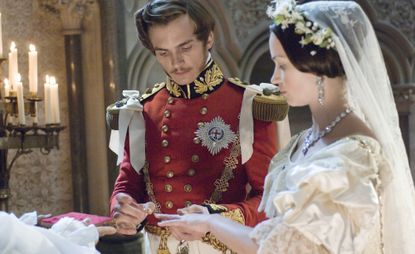How preconceptions of marriage have changed over time
Since it was defined back in 1866


Since it was defined back in 1866
Marriage was first described in the Hyde Decision of 1866 as 'the voluntary union for life of one man and one woman, to the exclusion of all others.'
But, what does marriage mean today? According to Aviva, the concept of 'marriage' (and a traditional wedding) is outdated. Instead, couples are shunning marriages for different ways to live together. There's no more being 'given away' in love, but taking control.
So, seeing as we've already investigated wedding traditions around the world (and the wedding traditions that are dying out) , we thought we'd look into how marriages have changed over time, too.
The first marriages in ancient Mesopotamia, over 4,000 years ago, saw wives (usually aged between 14-18) bought and sold in a 'marriage market' to grooms in their 20s. The deal was often arranged by the couples' parents.
And it wasn't really until the 17th century that people started marrying for love, rather than money or politics. This Enlightenment Age was also when young people started earning more and not needing financial help from their parents any more.
Then, in the 20th century, women got the vote and gender equality became the norm. Plus, the introduction of contraception and it being commonplace for women to go to work meant that couples could plan how many children they wanted to have.
Marie Claire Newsletter
Celebrity news, beauty, fashion advice, and fascinating features, delivered straight to your inbox!
By 2013, same-sex marriage was legalised in England and Wales (and Scotland followed suit in February 2014). Although, this wasn't the first time two men got married in history, as Roman emperor Nero actually married two different men in public ceremonies at the time, too.
So, yeah, marriages have gone through a lot of change - and they skyrocketed in the UK in 1940 with over 47 million people tying the knot.
Then, of course, was the 'baby boom' post-war where a record numbers of babies were born as couples felt more secure about the state of the world - and when the term 'nuclear family' came into being.
Today? There are over 1.9 million single-parent families in the UK, as well as married couples who remain child-free and long-term cohabiting couples.
Aviva's Family Finances report found 'that 56% of cohabitees don’t think marriage is necessary. Additionally, a quarter of UK adults who cohabit say that they don’t expect to ever get married. Despite tax benefits, some people just don’t see why they need to have a wedding.'
And considering the cost of your average wedding is now up 3000% since the 1950s, at an average of £30,000 per wedding, we don't blame them.
-
 Trust me, tinted lip balms are the low maintenance way of adding a wash of colour without the stress - here are 7 of the best
Trust me, tinted lip balms are the low maintenance way of adding a wash of colour without the stress - here are 7 of the bestFrom affordable to luxe, these are the ones I love
By Tori Crowther
-
 Here's exactly how to get your feet sandal-ready in 6 simple steps, according to a nail tech
Here's exactly how to get your feet sandal-ready in 6 simple steps, according to a nail techThese are the products I rely on
By Tori Crowther
-
 With their Sunlit Clementine & Vetiver collection, Molton Brown has mastered the aroma of an endless summer
With their Sunlit Clementine & Vetiver collection, Molton Brown has mastered the aroma of an endless summerEscapism at its finest
By Shannon Lawlor